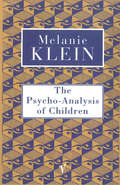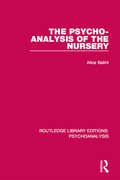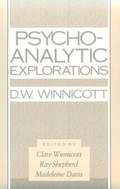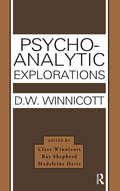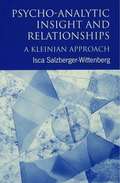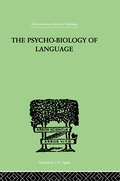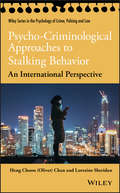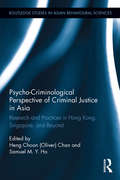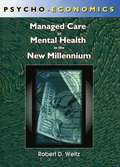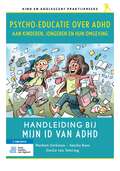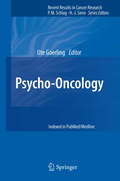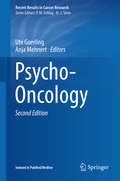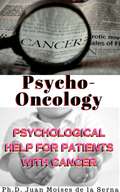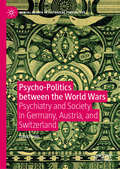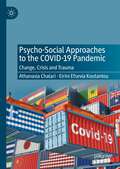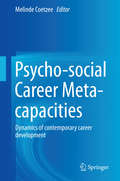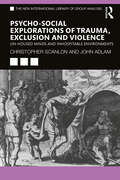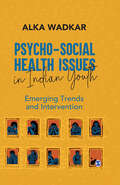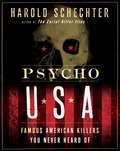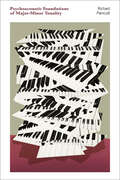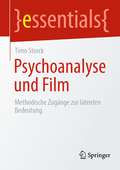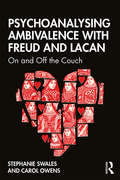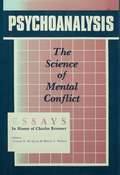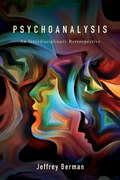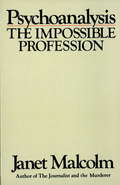- Table View
- List View
The Psycho-Analysis of Children: The Conduct Of The Psycho-analysis Of Children As Seen In The Treatment Of A Ten Year Old Boy
by Melanie KleinThe Psycho-Analysis of Children, first published in 1932, is a classic in its subject, and revolutionised child analysis. Melanie Klein had already proved, by the special technique she devised, that she was a pioneer in that branch of analysis. She made possible the extension of psycho-analysis to the field of early childhood, and in this way not only made the treatment of young children possible but also threw new light on psychological development in childhood and on the roots of adult neuroses and psychoses.
The Psycho-Analysis of the Nursery: Analysis Of The Nursery (Routledge Library Editions: Psychoanalysis)
by Alice BalintOriginally published in English in 1953, this title was first printed in Hungarian in 1931. Already translated into German, French and Spanish, Alice Balint (the first wife of Michael Balint) had intended to translate the title into English herself, but died suddenly at the beginning of the Second World War. Eventually their son, by this time a qualified doctor, was instrumental in bringing this edition about.
Psycho-Analytic Explorations
by D. W. Winnicott Clare Winnicott Ray Shepherd Madeleine DavisThis volume includes, among many important topics, critiques of Melanie Klein's ideas and insights into the work of other psychoanalysts, as well as gems of thought on such concepts as play in the analytic situation, the fate of the transitional object, regression in psychoanalysis, and the use of silence in psychotherapy.
Psycho-Analytic Explorations
by Donald W. WinnicottThis volume contains ninety-two works by this renowned writer, theoretician, and clinician. Includes critiques of Melanie Klein's ideas and insights into the works of other leading psychoanalysts, and thoughts on such concepts as play in the analytic situation, the fate of the transitional object, regression in psychoanalysis, and the use of silence in psychotherapy.
Psycho-Analytic Insight and Relationships: A Kleinian Approach
by Isca Salzberger-WittenbergMelanie Klein has been one of the most important contributors to our thinking about human development and human personality. In this classic text, Isca Salzberger-Wittenberg demonstates through theoretical exposition and the use of case material the ways in which Melanie Klein's main concepts and theories illuminate the practice of social casework. These theories are often complex and controversial, but this concise and lucid account continues to enable social workers and others in helping professions to judge the relevance of the Kleinian approach for themselves.
The Psycho-Biology Of Language: AN INTRODUCTION TO DYNAMIC PHILOLOGY (International Library Of Psychology Ser.)
by George Kingsley ZipfThis is Volume XXI in a series of twenty-one on the Cognitive Psychology. Orignally published in 1936, this is a study on the introduction to Dynamic Philology.
Psycho-Criminological Approaches to Stalking Behavior: An International Perspective (Wiley Series in Psychology of Crime, Policing and Law)
by Oliver Chan Lorraine L. SheridanProvides multidisciplinary coverage of stalking behavior worldwide from both academic and practical approaches Psycho-Criminological Approaches to Stalking Behavior: The International Perspective is a thorough, up-to-date overview of stalking perpetration and victimization in different regions of the world. This authoritative book brings together contributions from a team of leading scholars and practitioners that discuss a diverse range of interrelated topics and issues relevant to stalking and intrusive behavior from both theoretical and practical contexts. Whereas most of the literature on the subject is written from a Western viewpoint, this unique volume examines empirical research, policies, and practices from Asian and African countries, as well as those from Europe, the Americas, and Australia, to provide a truly global perspective. Divided into three parts, the book first examines theories and research on cross-national differences in stalking among college students, ex-partner stalking in Finland, cyberstalking victimization in Singapore, the heterogeneity of stalking and stalkers in Australia, public familiarity and understanding of stalking/harassing legislation in Australia, the United Kingdom, and the United States, and more. The book’s second part focuses on national portraits of stalking in a number of understudied populations, including Lithuania, Spain, Denmark, Portugal, and South Africa. Finally in the third section of the book, the chapters largely emphasize policy and best practice, including the Dutch model of policing stalking, risk assessment and management of stalking in Sweden, psycho-legal responses to online interpersonal harm, the German approach to stopping stalking, the United Kingdom response to assessing and managing stalking, and the work of the Danish Stalking Centre. This important contribution to the field: Offers insights from international professionals applicable in other geographical contexts Discusses the factors that influence social awareness and responses to stalking Explores the importance of victim vulnerability factors when managing risk of stalking Presents real-world case studies of stalking behavior, intimate partner violence, stalking victimization, and statutory and law enforcement efforts Reviews the intervention practices of the support institutions and justice systems of different countries Psycho-Criminological Approaches to Stalking Behavior: The International Perspective is an ideal primary or supplementary text for courses in criminology, criminal justice, forensic psychology, and social and behavioral science, as well as a valuable source of reference for those who deal with offenders or victims of stalking, including law enforcement agents, mental health professionals, legal practitioners, social services personnel, and policy makers.
Psycho-Criminological Perspective of Criminal Justice in Asia: Research and Practices in Hong Kong, Singapore, and Beyond (Routledge Studies in Asian Behavioural Sciences)
by Heng Choon Chan Samuel M.Y. HoThis book offers both theoretical and practical examinations of the psycho-criminology of criminal justice in Asia, with particular emphasis on the Hong Kong and Singapore contexts. It is designed to present the current state of the field, which addresses key topics in three major sub-areas – policing and legal system, offender rehabilitation and treatment, and research and future directions. Written by academics with extensive research experience in their respective topics and senior ranking practitioners in their fields, topics include psychologists’ involvement in different aspects of forensic investigation, police emotional reactions to major incidents, the application of psychological approaches in developing offender rehabilitation and treatment modules to address different offender’s criminogenic needs, and legal issues related to the insanity defence, fitness to plead, the jury system, and the procedural justice and legitimacy. An important reference for post-graduate courses, this book will be of special interest to criminologists and psychologists working in forensic settings, mental health professionals, policy-makers, police personnel, prison officials, and legal executives. <P><P>Chapters include: <P><P>1. Youth gang offenders in Singapore <P><P>2. Offender rehabilitation: the Hong Kong Correctional Services Department <P><P>3. Juries as decision makers in East Asian judicial systems: Hong Kong, the Mainland China, South Korea, and Japan <P><P>4. The psychology of violent extremism: what we know and what else we need to do
Psycho-Economics: Managed Care in Mental Health in the New Millennium
by Robert D. WeitzDevelop new ways to provide ethical, effective mental health services in a world of managed care!Psycho-Economics gives psychologists and mental health care administrators suggestions for handling the changes that have come with the advent of managed care. Using empirical research and practitioner accounts, this informative book assesses the impact of managed care, suggests ways to ameliorate its negative effects, and proposes ideas for the improvement of the managed care system and mental health care in general. Psycho-Economics takes a clear look at the ways in which the managed care system has altered the practice of mental health care. While acknowledging its positive effects on accountability and provision of a broader variety of care options, the chapter authors also note its powerful negative effects, including cutbacks in length of treatment, potential abuses of confidential medical records, and over-prescribing of mood-altering drugs. Yet the book also offers hope for psychologists, social workers, and other counselors. By developing diversified areas for professional practice, collaborating with primary care physicians, and creating corporate education opportunities, psychologists can contribute their expertise to people who might otherwise have never sought them out. Moreover, mental health professionals can embrace new opportunities in treating substance abuse, behavioral health, and such specialized areas as forensic psychology, domestic violence, crisis counseling, and employee screening. These areas and other new developments offer you a chance to build a solid practice devoted to serving society's needs.Psycho-Economics: brings practitioners effective, innovative approaches to clinical practice in relation to managed mental health care fosters awareness of the means by which managed care affects the quality of care that clients receive points out the steps that can be taken to minimize the negative effects that managed care dictates on the quantity and quality of mental health care highlights ethical and legal considerations that should be of concern to providers of mental health services encourages discussion of the future of the managed care system and its impact on providers and clientsPsycho-Economics is a survival guide which will help contemporary practitioners like you maintain ethical and effective practices while coping with the administrative expectations of managed care systems.
Psycho-educatie over ADHD aan kinderen, jongeren en hun omgeving: Handleiding bij Mijn ID van ADHD (Kind en adolescent praktijkreeks)
by Marleen Derkman Sascha Roos Emilie van TeteringIn deze handleiding wordt een protocol voor psycho-educatie over ADHD gericht op kinderen en jongeren, hun ouders en school theoretisch onderbouwd en praktisch uitgelegd. Hiermee kunt u als behandelaar kinderen, jongeren en hun omgeving op gestandaardiseerde wijze uitleg geven over ADHD, zodat er aan het einde van de psycho-educatie sprake is van een beter idee (ID) van ADHD.Dit protocol voorziet in de behoefte om in Nederland op meer eenduidige en wetenschappelijk onderbouwde wijze psycho-educatie over ADHD te kunnen geven. Daarmee kan dit protocol dienen als uitgangspunt bij de noodzakelijke eerste stap in de behandeling van ADHD. Naast een theoretische inleiding op ADHD, bevat de handleiding een uitgebreide en concrete uitwerking van de psycho-educatie gericht op kinderen/jongeren, hun ouders en onderwijsprofessionals. Hiermee heeft de behandelaar een compleet en op elkaar afgestemd psycho-educatieprogramma in handen.Het bijbehorende werkboek ‘Mijn ID van ADHD’ is geschreven voor kinderen (8 t/m 12 jaar) en jongeren (13 tot 18 jaar) met ADHD. Hierdoor kan de behandelaar de psycho-educatie op maat en herhaaldelijk aanbieden.
Psycho-Oncology
by Ute GoerlingPsycho-oncology is a thriving discipline in cancer care, and numerous research activities have been undertaken in the endeavour to improve treatment outcomes and to gain a better understanding of the psychosocial consequences of cancer. This book presents and discusses the latest findings from science and practice for a broad range of psychological and social issues related to cancer and its treatments. Not only are general psychosocial impacts of cancer described, but the very common fear of progression is elucidated. The relevance of psycho-oncology at different stages of disease (during oncological treatment, in rehabilitation, and during palliative care) is explained, and various psycho-oncological interventions are illustrated. Other important topics are the experience of being a cancer survivor, who may be cured but not be healthy, the psychological burden on relatives, and gender differences in coping with cancer. Quality of life and patient-reported outcomes are also commented on since they are among the key benchmarks for successful coping with the diagnosis of cancer, its treatment, and its late effects. The chapters are almost all written by distinguished scientists, but as we often learn most from those affected by cancer, one author speaks for herself as a patient.
Psycho-Oncology
by Ute Goerling Anja MehnertPsycho-oncology is a thriving discipline in cancer care, and numerous research activities have been undertaken in the endeavour to improve treatment outcomes and to gain a better understanding of the psychosocial consequences of cancer. This book presents and discusses the latest findings from science and practice for a broad range of psychological and social issues related to cancer and its treatments. Not only are general psychosocial impacts of cancer described, but the very common fear of progression is elucidated. The relevance of psycho-oncology at different stages of disease (during oncological treatment, in rehabilitation, and during palliative care) is explained, and various psycho-oncological interventions are illustrated. Other important topics are the experience of being a cancer survivor, who may be cured but not be healthy, the psychological burden on relatives, and gender differences in coping with cancer. Quality of life and patient-reported outcomes are also commented on since they are among the key benchmarks for successful coping with the diagnosis of cancer, its treatment, and its late effects. The chapters are almost all written by distinguished scientists, but as we often learn most from those affected by cancer, one author speaks for herself as a patient.
Psycho-oncology: Psychological Help for Patients with Cancer
by Juan Moises de la Serna Juliana ArangoBook description: In this e-book, the problem of cancer is approached from a psychological point of view. Psycho-oncology is the name of the branch of psychology dealing with cancer. For this purpose, the latest research results on the topic are introduced in such a way that patients and their families can learn about the last findings with regards to the psychological aspects of cancer, its onset, development, and treatment. This reference e-book can help readers put one of the most common diseases today into perspective.
Psycho-Politics between the World Wars: Psychiatry and Society in Germany, Austria, and Switzerland (Mental Health in Historical Perspective)
by David FreisThis book is about the psycho-political visions and programmes in early-twentieth century Germany, Austria, and Switzerland. Amidst the political and social unrest that followed the First World War, psychiatrists attempted to use their clinical insights to understand, diagnose, and treat society at large. The book uses a variety of published and unpublished sources to retrace major debates, protagonists, and networks involved in the redrawing of the boundaries of psychiatry’s sphere of authority. The book is based on three interconnected case studies: the overt pathologisation of the 1918/19 revolution led by right-wing German psychiatrists; the project of medical expansionism under the label of ‘applied psychiatry’ in inter-war Vienna; and the attempt to unite and implement different approaches to psychiatric prophylaxis in the movement for mental hygiene. By exploring these histories, the book also sheds light on the emergence of ideas that still shape the field to the present day and shows the close connection between utopian promises and the worst abuses of psychiatry.
Psycho-Social Approaches to the Covid-19 Pandemic: Change, Crisis and Trauma
by Anathasia Chalari Eirini Efsevia KoutantouThis book explores how meaning-making during the COVID-19 pandemic, and specifically during the period of the April 2020 lockdowns, may be derived from shared lived experience among participants, residing in diverse geographical regions. This study conducted 46 in-depth interviews with Greek participants residing in 13 district countries and 23 cities around the globe and argues that meaning making of the pandemic derives from shared lived experiences of radical change and everyday transformations, fearful as well as well as hopeful perceptions of crisis and trauma emerging through loss of life before the pandemic.
Psycho-social Career Meta-capacities
by Melinde CoetzeeThis book introduces a coherent perspective on the self-regulatory career meta-capacities that individuals, as career agents, need to successfully manage their career development in a boundaryless occupational world. Enriched by empirical data and case studies by subject specialists in the fields, it serves as a cutting-edge benchmark for specialists, professionals and post-graduate students in the careers field to study. This book allows an in-depth view of the most recent research trends on the critical psycho-social constructs influencing the adaptation, adaptivity, adaptability and employability of individuals in a turbulent, uncertain and chaotic work world. In addition, it offers the practising professional new perspectives of career constructs and measures to consider in career counseling and guidance for the contemporary career.
Psycho-social Explorations of Trauma, Exclusion and Violence: Un-housed Minds and Inhospitable Environments (The New International Library of Group Analysis)
by Christopher Scanlon John AdlamThe central theme of this book is the operation of intersecting discourses of power, privilege and positioning as they are revealed in fraught encounters between in-groups and out-groups in our deeply fractured world. The authors offer a unique perspective on inter-group dynamics and structural violence at local, societal, cultural and global levels, dissecting processes of toxic ‘othering’ and psychosocial (re-)traumatisation. The book offers the Diogenes Paradigm as a unique conceptual tool with which to analyse the ways in which those of us who come to be located outside or on the margins of dominant social structures are, in one way or another, the inheritors of the legacies of centuries of oppression and exclusion. This analysis offers a distinctive psycho-social redefinition of trauma that foregrounds the relationship between the inhospitable environments we generate and the experiences of un-housedness that we thereby perpetuate. Written in an engaging and accessible style, Psycho-social Explorations of Trauma, Exclusion and Violence directly addresses pressing global issues of racial trauma, human mobility and climate disaster, and offers a manifesto for the creative re-imagining of the places and spaces in which conversations about restructuring and reparation can become sustainable. This is an essential and compelling book for anyone committed to social justice, especially for all practitioners working in health, social care and community justice settings, and researchers and academics across the behavioural and social sciences.
Psycho-social Health Issues in Indian Youth: Emerging Trends and Intervention
by Alka WadkarPsycho-social Health Issues in Indian Youth: Emerging Trends and Intervention examines challenges to psycho-social health of Indian adolescents and youth. Exploring issues afflicting psychological, social and physiological well-being of the youth, the book recommends intervention and the way ahead. It links the theory to Indian scenario by giving real-life examples and incidences, which makes it interesting. The book studies emerging obstacles to psycho-social well-being from psychological, socio-cultural and biological perspectives. It examines issues such as pornography addiction, substance abuse and youth aggression. It further explores the effects of psychologically devastating events such as harassment, marital rape and emotional abuse. This book also analyses trauma and the alarmingly high suicide rates among adolescents and young adults. Everyday behavioural problems—that are often neglected—such as impact of gender socialization on individual’s personality and culture-based issues about marriage have been extensively studied. It further examines the distress and mental turmoil caused by the COVID-19 pandemic. The book seeks to examine the consequences, as well as potential antidotes, to the modern-day challenges to psycho-social wellness and well-being.
Psycho USA: Famous American Killers You Never Heard Of
by Harold SchechterAMERICA’S MOST COLD-BLOODED! In the horrifying annals of American crime, the infamous names of brutal killers such as Bundy, Dahmer, Gacy, and Berkowitz are writ large in the imaginations of a public both horrified and hypnotized by their monstrous, murderous acts. But for every celebrity psychopath who’s gotten ink for spilling blood, there’s a bevy of all-but-forgotten homicidal fiends studding the bloody margins of U.S. history. The law gave them their just desserts, but now the hugely acclaimed author of The Serial Killer Files and The Whole Death Catalog gives them their dark due in this absolutely riveting true-crime treasury. Among America’s most cold-blooded you’ll meet • Robert Irwin, “The Mad Sculptor”: He longed to use his carving skills on the woman he loved—but had to settle for making short work of her mother and sister instead. • Peter Robinson, “The Tell-Tale Heart Killer”: It took two days and four tries for him to finish off his victim, but no time at all for keen-eyed cops to spot the fatal flaw in his floor plan. • Anton Probst, “The Monster in the Shape of a Man”: The ax-murdering immigrant’s systematic slaughter of all eight members of a Pennsylvania farm family matched the savagery of the Manson murders a century later. • Edward H. Ruloff, “The Man of Two Lives”: A genuine Jekyll and Hyde, his brilliant scholarship disguised his bloodthirsty brutality, and his oversized brain gave new meaning to “mastermind.” Spurred by profit, passion, paranoia, or perverse pleasure, these killers—the Witch of Staten Island, the Smutty Nose Butcher, the Bluebeard of Quiet Dell, and many others—span three centuries and a host of harrowing murder methods. Dramatized in the pages of penny dreadfuls, sensationalized in tabloid headlines, and immortalized in “murder ballads” and classic fiction by Edgar Allan Poe and Theodore Dreiser, the demonic denizens of Psycho USA may be long gone to the gallows—but this insidiously irresistible slice of gothic Americana will ensure that they’ll no longer be forgotten.
Psychoacoustic Foundations of Major-Minor Tonality
by Richard ParncuttA fascinating interdisciplinary approach to how everyday Western music works, and why the tones, melodies, and chords combine as they do.Despite the cultural diversity of our globalized world, most Western music is still structured around major and minor scales and chords. Countless thinkers and scientists of the past have struggled to explain the nature and origin of musical structures. In Psychoacoustic Foundations of Major-Minor Tonality, music psychologist Richard Parncutt offers a fresh take, combining music theory—Rameau&’s fundamental bass, Riemann&’s harmonic function, Schenker&’s hierarchic analysis, Forte&’s pitch-class set theory—with psychology—Bregman&’s auditory scene, Terhardt&’s virtual pitch, Krumhansl&’s tonal hierarchy. Drawing on statistical analyses of notated music corpora, Parncutt charts a middle path between cultural relativism and scientific positivism to bring music theory into meaningful discourse with empirical research.Our musical subjectivity, Parncutt explains, depends on our past musical experience and hence on music history and its social contexts. It also depends on physical sound properties, as investigated in psychoacoustics with auditory experiments and mathematical models. Parncutt&’s evidence-based theory of major-minor tonality draws on his interdisciplinary background to present a theory that is comprehensive, creative, and critical. Examining concepts of interval, consonance, chord root, leading tone, harmonic progression, and modulation, he asks:Why are some scale tones and chord progressions more common than others?What aspects of major-minor tonality are based on human biology or general perceptual principles? What aspects are culturally arbitrary? And what about colonial history?Original and provocative, Psychoacoustic Foundations of Major-Minor Tonality promises to become a foundational text in both music theory and music cognition.
Psychoanalyse und Film: Methodische Zugänge zur latenten Bedeutung (essentials)
by Timo StorckDieses essential widmet sich der Verbindung von Psychoanalyse und Film. Die Psychoanalyse eignet sich für eine methodisch geleitete Filmbetrachtung. Dabei kommt es nicht zu einer Anwendung der psychoanalytischen Theorie, sondern zu einer Anwendung ihrer Methode eines reflektierten In-Beziehung-Stehen zu einem Gegenüber. So können latente Bedeutungen in den Blick genommen und eine Interpretation entwickelt werden. Im vorliegenden essential werden die Möglichkeiten eines solchen Zugangs rekonstruiert und bestehende Ansätze vorgestellt. Schließlich wird der Vorschlag eines Leitfadens zur Durchführung einer filmpsychoanalytischen Interpretation gemacht. Zahlreiche Filmbeispiele dienen dabei der Veranschaulichung.
Psychoanalysing Ambivalence with Freud and Lacan: On and Off the Couch
by Stephanie Swales Carol OwensTaking a deep dive into contemporary Western culture, this book suggests we are all fundamentally ambivalent beings. A great deal has been written about how to love – to be kinder, more empathic, a better person, and so on. But trying to love without dealing with our ambivalence, with our hatred, is often a recipe for failure. Any attempt, therefore, to love our neighbour as ourselves – or even, for that matter, to love ourselves – must recognise that we love where we hate and we hate where we love. Psychoanalysis, beginning with Freud, has claimed that to be in two minds about something or someone is characteristic of human subjectivity. Owens and Swales trace the concept of ambivalence through its various iterations in Freudian and Lacanian psychoanalysis in order to question how the contemporary subject deals with its ambivalence. They argue that experiences of ambivalence are, in present-day cultural life, increasingly excised or foreclosed, and that this foreclosure has symptomatic effects at the individual as well as social level. Owens and Swales examine ambivalence as it is at work in mourning, in matters of sexuality, and in our enjoyment under neoliberalism and capitalism. Above all, the authors consider how today’s ambivalent subject relates to the racially, religiously, culturally, or sexually different neighbour as a result of the current societal dictate of complete tolerance of the other. In this vein, Owens and Swales argue that ambivalence about one’s own jouissance is at the very roots of xenophobia. Peppered with relevant and stimulating examples from clinical work, film, television, politics, and everyday life, Psychoanalysing Ambivalence breathes new life into an old concept and will appeal to any reader, academic, or clinician with an interest in psychoanalytic ideas.
Psychoanalysis: The Science of Mental Conflict
by Arnold D. Richards & Martin S. WillickOver the course of three decades, in works spanning questions of theory, technique, and clinical practice, Charles Brenner has emerged as one of the preeminent analysts of his generation, a thinker whose probing estimation of mental conflict has promoted the evolutionary growth of analysis as theory even as it has clarified the clinical import of analysis as therapy. In Psychoanalysis: The Science of Mental Conflict, distinguished theorists and clinicians pay homage to Brenner by presenting original essays that converge in their estimation of analysis as "the science of mental conflict." In sections that encompass "The Theory of Psychoanalysis," "The Concepts of Psychoanalysis," "The Technique of Psychoanalysis," "The Clinical Practice of Psychoanalysis," "The Teaching of Psychoanalysis," and "The Application of Psychanalysis," the contributors show how the perspective of conflict - broadened and refined by the clinical findings of recent decades - offers a vehicle for creative theory-building and, as such, a conceptual handle for apprising the indications for, and action of, psychoanalytic therapy. Arnold Richards' comprehensive overview of Brenner's ranging contributions to theory and practice, along with Martin Willick's critical introductions to the various sections of the book, round out a collections whose scope is complimented by its unusual coherence and thematic unity. Taken together, the essays comprising this book present readers with a cogent summary of current psychoanalytic thinking, along with an exciting preview of where it is heading in the future. As such, this volume will be welcomed not only by analysts, but by all mental health professionals who draw on, and learn from, the psychoanalytic assessment of conflict in mental life. It is a work that follows Brenner's own example in promoting the critical understanding of a generation of theorists, clinicians, and educators.
Psychoanalysis: An Interdisciplinary Retrospective
by Jeffrey BermanPsychoanalysis: An Interdisciplinary Retrospective offers in-depth discussions of and conversations with six psychoanalytic writers: Christopher Bollas, Nancy Chodorow, Sander L. Gilman, Adam Phillips, and Allen and Joan Wheelis. All are genuinely interdisciplinary in their work, bridging multiple cultural and professional positions, but all are deeply rooted in the humanities. They are all also highly controversial, challenging and critiquing conventional psychoanalytic wisdom while also devoting themselves to expanding psychoanalytic knowledge. Drawing on interviews as well as his own readings, Jeffrey Berman examines the continuities and discontinuities in each writer's work while also exploring the interrelationships between psychoanalysis and the humanities. The book ultimately offers a portrait of psychoanalysis as a work in progress, a plurality of visions that might more aptly be termed psychoanalyses.
Psychoanalysis: The Impossible Profession
by Janet MalcolmThrough an intensive study of "Aaron Green," a Freudian analyst in New York City, New Yorker writer Janet Malcolm reveals the inner workings of psychoanalysis.
